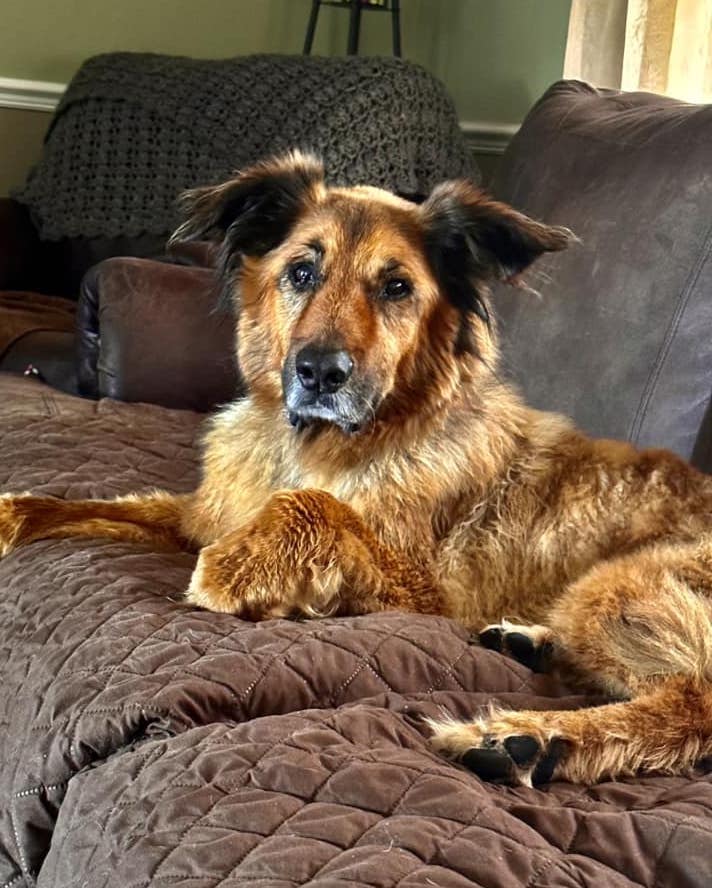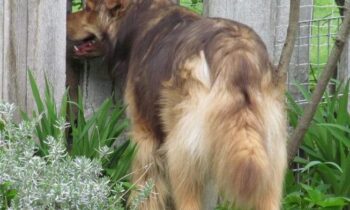
It was a normal weekend at our house. I went to bed early. Then it became one of the worst nights of my life. My dog experienced a cascade of seriously unusual behaviors that seemed to indicate distress. He was beyond restless: he was frenetic. He paced, he circled, he jumped onto the bed, couldn’t settle, jumped off. And the vocalizations! He barked, whined, groaned … endlessly.
In his kennel, he turned and turned, he dug at the door, he scratched at the bed.
I was sure it was something I’d done. Given him human food, I thought first. But the truth was what I’d given him amounted to a total of two Cheetos and a thumbnail-sized crumb of an oatmeal (no raisins) cookie. But I felt guilty. I was so frightened.
I checked everything I know to check: breathing, gums, mouth, throat, ears; no body tenderness or swelling. Hour after hour, I took him out—eliminations as usual, no issues obvious there. When he came back inside, the behaviors continued. It was an almost sleepless night.
When he woke up, he seemed to be his normal self!
Fast-forward a couple of days when Eileen Anderson sent me, for a blog I was working on, the link to an article she’d written about a condition that veterinary behaviorists (the subject of that blog) often treat: Canine Cognitive Dysfunction. As I read the article, I remembered what I knew—and how much I didn’t know—about that condition.
The symptoms were behaviors my dog had exhibited that awful night. And the article stressed the importance of early treatment.
I made a vet appointment. My dog was diagnosed.
I reached out to my friends. “I want to talk about Canine Cognitive Dysfunction. My dog was diagnosed about ten days ago. We are adjusting.
“When I tell friends and neighbors about his diagnosis, I am most surprised that so many of them—most of whom have or have had dogs—are unaware that such a condition exists. I want novice dog guardians to know what it is because, some day, their own dog may have symptoms and they won’t know what to do.
“I need your help. Has your dog or a dog you know shown symptoms of Canine Cognitive Dysfunction? Will you tell us about it? I want to share your stories of dealing with this condition—which may affect dogs as they age—to inform novice dog guardians.
“This is my first post on the topic. I want to write more. Right now, I want to ‘get the ball rolling’ for a first blog on the subject of Canine Cognitive Dysfunction. I want to approach the topic gently by sharing personal stories from you, along with my own. I do not want to scare the crap out of anyone whose dog is already old!
“First, let’s talk about how we guessed there might be ‘something wrong’ with a dog because we saw unusual behavior we didn’t understand. Go for it! Help me introduce a difficult subject.”
Here are some of their answers:
Jane Beecham (United Kingdom) We thought our old dog had it. Sudden change in behavior, fear, trying to escape, wandering aimlessly round the garden. Turns out it was a urine infection. Affects old dogs like it can affect older people. Who knew?
Jody Anne (Missouri) Jane, that’s an excellent example of why CCD is a diagnosis of exclusion. Rule out all the various conditions that can present similar symptoms, and if the dog has NONE of those, but still has symptoms, then we can land on CCD.
Nan Kene Arthur (Arizona) My oldest dog kept waking up several times a night and would bark until someone got up to direct her back on the bed or to go outside. She was having some trouble walking, but only now and then, so I mentioned it and the vet prescribed some medication for joints and pain. Two days later, Willow slept through the night and has since … six weeks now. Pain can present in weird ways, and now that her pain is less, she is sleeping. I thought it was CCD, but it was pain in her rear joints that was waking her up.
Evee Linden (Connecticut) CCD is much more common than people know and understand. It also comes with various grades at different ages. Small personality changes, lowered tolerance for situations that before didn’t bother them—most people don’t realize it until it is very far gone. Our ‘old man’ became male-dog selective after always being very social, and he was only nine at the time. At 14, he started using body language, when asked to ‘leave it,’ that he used when he first came to us at age six. He is now down to basic functions of eating, bathroom, and sleeping, with some excited bounces for treats every now and then. All his cues are gone; he often stands and stares into a wall. He is still happy, with good appetite, but he is slowly deteriorating. It is a condition that it is important to be aware of, especially since these personality changes cannot be trained away. I’ve been called in to [work with] older dogs with newfound behavioral issues, and it often has boiled down to CCD when digging deeper. A lot of trainers are not aware and deploy all sorts of training methods when it should be medicine and management.
Jody Anne It’s dementia. Roughly 70% of dogs over the age of ten have or will develop it to at least some degree—much like humans over the age of 80. It’s a slowing down of mental processing, loss of some memory, and reductions in being able to learn and retain new things.
Helen St. Pierre (New Hampshire) It’s very common in senior dogs, and many of my hospice and senior rescues have it or develop it. It can come on suddenly or gradually. Dogs that struggle with it can have issues with their sleep cycle, or get disoriented, or even stop recognizing people they know. Many times it can be secondary to another disease or illness, which exacerbates it as that disease progresses. It’s heartbreaking to watch and to be a part of, so it’s important to understand quality of life and quality of death when you realize your dog is suffering from this. Purpose, joy, and function all have to be considered and it may be something you have to monitor for months. There are some things that can help, though—some diets, supplements, and even medication from your vet.
Colette Kase (Mexico) I have lived with two dogs with CCD and one who was misdiagnosed (it turned out to be degenerative myelopathy). It can be very distressing for both dog and carer. For the carer, it can be like returning to puppy time. It can be very difficult for dog carers to identify the right time to euthanize their dog, as the gradual decline may be difficult to notice when you are with the dog every day. It is always important to have veterinary support. I’ve used Selegeline, Vivitonin, and CBD with my dogs. (I realize that CBD is experimental, but it was given under veterinary advice and supervision.) I would also recommend that carers of dogs with CCD have a checklist to measure their dog’s quality of life to help assess the decline.
Meredith Minkin (Georgia) I have had two dogs with CCD. They had very different presentations and very different outcomes. My current 16.5-year-old has just started displaying symptoms (which will make this dog #3). Not all dogs are stressed. Some just get stuck in places. One of my pups was very content until the end of life. I’m happy to share my different experiences with different dogs if needed. They had various kinds of supportive care as well.
Risë VanFleet (Pennsylvania) Lots of great info here. Have lived with this a few times. It can be both difficult and poignant, and sometimes humorous.
Tori Peterson Keyser (Wisconsin) My girl has this. It’s tough. Here is a great resource—https://dogdementia.com.
Summer Storm Kingery DVM (North Carolina) I just want to mention that there is a questionnaire to help evaluate for CCD, and that a physical exam, lab work, and urinalysis should always be performed to rule out other possible causes of symptoms. Some dogs may also need other diagnostic testing. Finally, there are medications that can help, and making sure inflammatory conditions like arthritis and allergies are well controlled can reduce some symptoms. Also, enriching your dog’s life through varieties of puzzle feeders, food toys, dog sports, sniff walks, training, etc., can help slow onset and impact. Dog sports like barn hunt, freestyle, and trick training are great at any age!
Sue Heron (Florida) My 15-year-old. I can tell he is losing his confidence. He used to be my bullheaded one. Now he is just a bit insecure—but let me tell you, this dog still does things on his own terms. He swims every day on his own. He acts like he cannot see me, but he always knows where I am.

Photo by Sue Heron
NEXT WEEK: More about Canine Cognitive Dysfunction—personal stories and suggestions.



